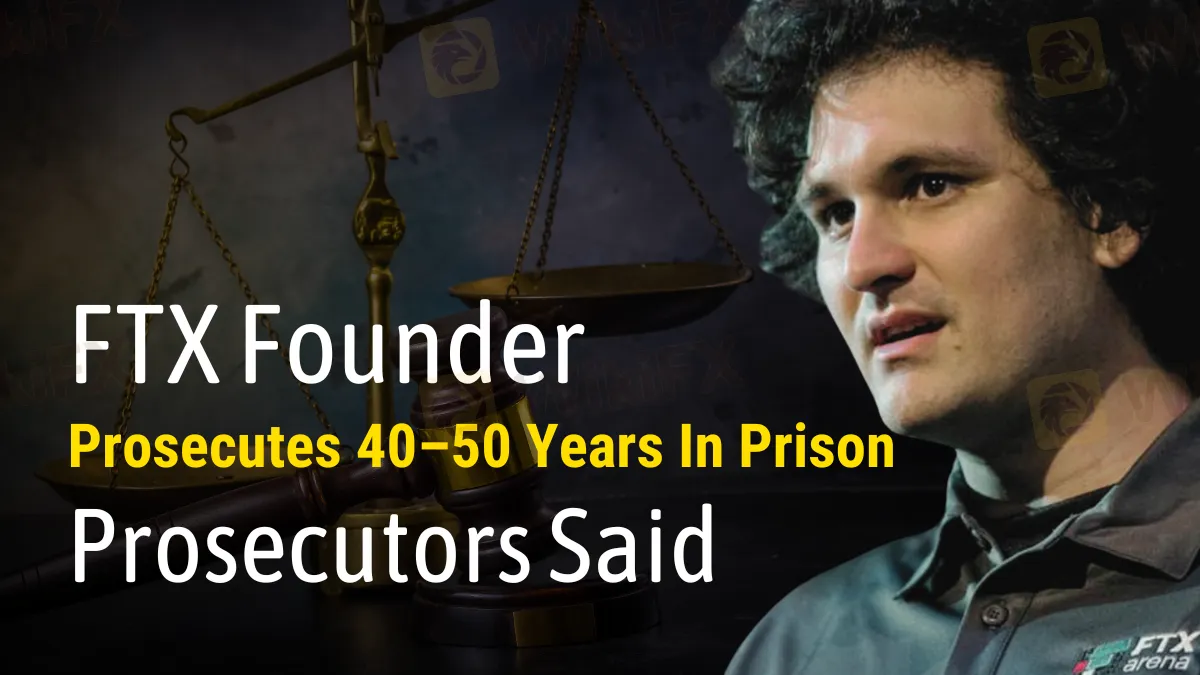简体中文
繁體中文
English
Pусский
日本語
ภาษาไทย
Tiếng Việt
Bahasa Indonesia
Español
हिन्दी
Filippiiniläinen
Français
Deutsch
Português
Türkçe
한국어
العربية
FTX Founder Prosecutes 40–50 Years In Prison, Prosecutors Said
Abstract:Sam Bankman-Fried, a prominent figure in FTX, is currently facing the prospect of a 40–50-year prison term for what prosecutors label as "historic fraud." This situation highlights the shifting landscape of ethics and risks in the cryptocurrency domain.

FTX's face, Sam Bankman-Fried, is part of a tale about the turbulent and closely watched cryptocurrency market. Bankman Fried, a pioneer of Bitcoin, was detained and subsequently released on charges of fraud and conspiracy. Federal investigators expect Bankman-Fried to serve 40–50 years for his “historic fraud.” The case recounts a famous cryptocurrency owner's downfall and warns of the risks and moral dilemmas of digital money's rapid evolution.
Bankman Fried's Bahamas-to-US extradition action disclosed FTX's alleged mismanagement and fraud in December 2022. According to the prosecution, Bankman-Fried was in charge of carrying out a financially significant scheme. From 2017 to 2022, he may have misused $10 billion from investors and consumers. This financial instability shook Bitcoin and ordinary investors.
Bankman-Fried's offenses were complex, including deception of investors, forging the papers, stealing from customers, and making unlawful payments to political parties, as the prosecutors' statement before the court explained. Prompting attention are the claims of more than $100 million in illicit political contributions and $150 million in bribes to Chinese authorities, underscoring the magnitude and influence of Bankman-Fried's conduct. Such charges provide a picture of a concerted attempt to take advantage of and control the political and economic structures for one's benefit.

Bankman-legal Fried's team has resisted the suggested punishment, even in light of the seriousness of these allegations. For a first-time, nonviolent offender, they contend that the probation office's original recommendation of a sentence of 100 years is too severe. Instead, emphasize Bankman-Fried's health difficulties and early Bitcoin technology ambitions in a shorter sentence. This defense tale aims to portray Bankman-Fried as a skilled scam artist turned dumb businessman whose ambitions deceived him.
A discussion has ensued regarding the cryptocurrency industry's ethics and regulations in response to the FTX failure and subsequent legal proceedings against Bankman-Fried. The case raises several intriguing concerns concerning accountability, investor protection, and the role of digital currency within the broader economic framework. With the approaching sentencing date, anticipation for the verdict is palpable among the general public and the cryptocurrency industry. It might change how the courts handle financial misbehavior, especially with new technology like cryptocurrency.
The fallout from FTX and the legal complications encountered by Bankman-Fried illustrate the precarious nature of confidence in the Bitcoin industry. The statement underscores the need for enhanced supervision and moral principles to safeguard investors and guarantee the steadiness of virtual banking networks. With the outcome of the Bankman-Fried case, the cryptocurrency market will probably be affected for some time, perhaps influencing future investor confidence and government regulations.

Disclaimer:
The views in this article only represent the author's personal views, and do not constitute investment advice on this platform. This platform does not guarantee the accuracy, completeness and timeliness of the information in the article, and will not be liable for any loss caused by the use of or reliance on the information in the article.
Read more

RM5.9M Lost to "Davidson Kempner Capital Management" Facebook Scam
A private contractor in Malaysia faced a devastating loss of over RM5.9 million after falling victim to a fraudulent investment scheme promoted on Facebook. Tempted by the scheme’s impressive claims and credentials, the victim began investing in September 2024. The investment process required him to download an application called A-Trade, which was readily available on the Apple Store.

Bitcoin in 2025: The Opportunities and Challenges Ahead
Bitcoin experienced a transformative year in 2024, with its value surpassing $100,000 and attracting attention from institutional investors, retail traders, and governments alike. This growth was driven by milestones such as the approval of spot bitcoin ETFs and increasing adoption by major financial institutions. As 2025 begins, bitcoin’s position as a cornerstone of the digital financial ecosystem is stronger than ever.

BI Apprehends Japanese Scam Leader in Manila
The Bureau of Immigration apprehended a Japanese scam leader in Manila for targeting elderly victims in Japan, with plans to investigate possible local operations.

DICT Pushes for Stronger Cyber Laws to Address Evolving Scams
The DICT is advocating for stronger cybercrime laws to tackle the growing and evolving threat of online scams in the Philippines.
WikiFX Broker
Latest News
High-Potential Investments: Top 10 Stocks to Watch in 2025
US Dollar Insights: Key FX Trends You Need to Know
Why Is Nvidia Making Headlines Everywhere Today?
Discover How Your Trading Personality Shapes Success
FINRA Charges UBS $1.1 Million for a Decade of False Trade Confirmations
Bitcoin in 2025: The Opportunities and Challenges Ahead
BI Apprehends Japanese Scam Leader in Manila
Big News! UK 30-Year Bond Yields Soar to 25-Year High!
SQUARED FINANCIAL: Your Friend or Foe?
Join the Event & Level Up Your Forex Journey
Currency Calculator






